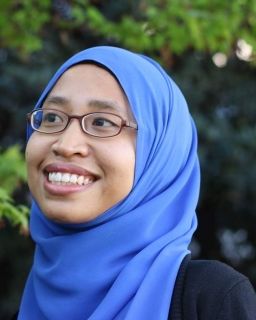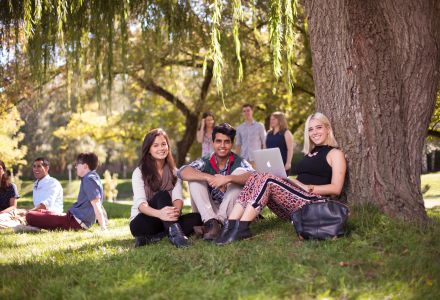Khadijah Khalid
I learned not only how to advance my knowledge, but more importantly, to be a better person.
Three years ago, Khadijah Khalid was working in speech pathology in her home country of Malaysia. Malaysia is a particularly challenging place to be in that profession, given the multiple languages that are spoken. Khadijah encountered some of these challenges throughout her work, and in coming to ANU, sought to address them.
Studying at ANU was an easy choice for her. Firstly, it offers the Master of General and Applied Linguistics, which she signed on for. Secondly, there was Canberra’s reputation as a safe city: “That helped my dad to let me stay thousands of miles from home,” she says.
As a speech language pathologist (SLP), Khadijah helped people with problems relating not just to speaking more clearly, but difficulties with communication. In tending to these issues, when dealing with clients who spoke the same language as her, the task was made more straightforward. But often, her clients came from different backgrounds and weren’t very fluent in her mother tongue of Malay. In that situation, either they couldn’t find a common language or one or both wouldn’t be very fluent in a common language.
“This contributes to a high risk of misinterpretation and miscommunication, which can lead to misdiagnosis and improper management,” Khadijah says.
“Therefore, research on how to systematically manage SLP-client interactions where participants lack a language variety in common is essential.”
To make matters worse, there weren’t enough tools available in the languages spoken by her clients to diagnose their language and communication issues.
Khadijah set about tackling the first issue through her Masters degree, interviewing Malaysian SLPs to understand the strategies they use to compensate for the communication gap between them and their clients where there is limited or no shared language.
“[I analysed what those SLPs shared, and was able to compile a set of current practices that occur in this situation, and developed strategies that can be used to facilitate effective communication with multi-lingual clients],” she says.
“I’ve also recommended some practices when working with ad hoc and professional translators.”
The findings Khadijah has made will go some way to achieving her goal of improving the current healthcare services in Malaysia, particularly in speech therapy services. In returning home in December, after completing her degree, she applied and was accepted for a job back in her old field; this time working with children.
“After coming back, I became more critical and confident, especially when I want to make a clinical decision and consult my clients,” Khadijah says. “I’ve learned to be more empathetic and to keep learning from my surroundings.”
Khadijah’s time at ANU, including as a senior resident at Ursula Hall, have clearly shaped her as a person. Alongside studying, she supported and looked out for her fellow students (who no doubt also have parents interested in their safety) and has been invigorated for it.
“It was a very valuable experience,” Khadijah affirms.
“I learned not only how to advance my knowledge, but more importantly, to be a better person.”

